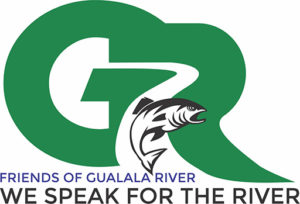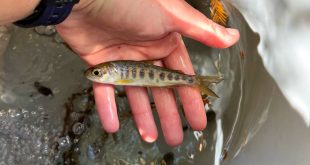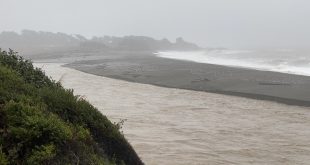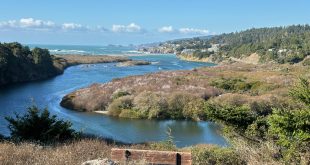by Tempra Board
Sea Ranch Soundings, Fall, 2020
© copyright 2020, The Sea Ranch Association
reprinted with permission
Editor’s note: On September 18, 2020, as this edition of Soundings was going to press, FoGR and the Center for Biological Diversity filed their federal lawsuit.
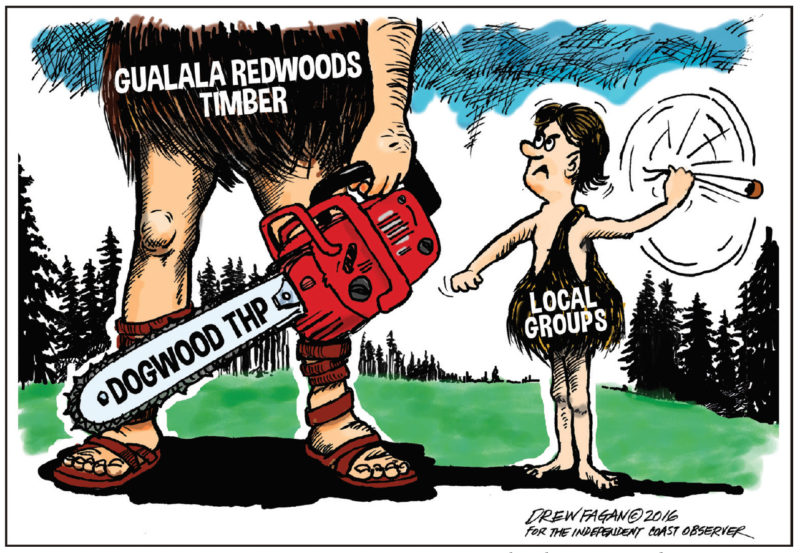
On July 7, 2020, Friends of the Gualala River (FoGR) joined forces with the Center for Biological Diversity to file a notice of intent to sue in federal court to stop Gualala Redwood Timber’s (GRT) Dogwood timber harvest plan. The intent to sue comes on the heels of FoGR’s appeal of the decision in a Sonoma Superior Court back in February, in which Judge Wick sided with California Forestry and Fire Protection (Cal-Fire) that logging Dogwood’s 342 acres in the Gualala River floodplain could proceed.
FoGR opposed Dogwood, asserting that it failed to: 1) identify and evaluate alternative timber harvest methods that would significantly reduce damage to sensitive floodplain habitat and species; and 2) include an accurate Cumulative Impact Assessment of Dogwood’s impact, including seasonal wetland surveys.
In appealing this decision to the State Appellate Court, FoGR obtained in April an injunction that halted any logging in the floodplain until the appeal could be heard. “If we hadn’t appealed, they would have logged Dogwood this year. It would have been done,” said Jeanne Jackson, FoGR’s board treasurer.
While this case continues, the extra time allowed FoGR to seek out the help of the Center for Biological Diversity, which has protected hundreds of millions of acres and hundreds of species across the globe through its scientific, advocacy, legal, and marketing programs. The Center has a current staff of more than 150, a $25 million annual budget, and a lawsuit success rate of 83%.
The intent to file suit is a required 60- day notification period, which, barring the unlikely event that Cal-Fire will reverse its approval of GRT’s Dogwood THP, will result in a suit filing around the time this issue of Soundings goes to press. The federal suit will allege that the THP would violate the Endangered Species Act due to the unlawful take of Northern California steelhead, Central California Coast coho salmon, California red-legged frog, marbled murrelet, and Northern spotted owl due to proposed logging, log hauling, roadbuilding, and road maintenance in the Gualala River floodplain.
The intent, filed by the offices of Gross & Klein LLP in San Francisco, adds, “The Logging Project would remove primarily mature redwoods (90-100 years old) from alluvial floodplains in the lower Gualala River watershed and is reasonably certain to result in the take of the Listed Species.” For those perhaps unfamiliar with what a logging operation looks like on the ground, the intent to sue explains:
“The Logging Project will involve the use of heavy equipment in floodplain areas; water drafting; cutting and felling trees; skidding harvested trees; hauling harvested trees; slash removal and stockpiling; and road construction, reconstruction, and maintenance. These logging activities will cause significant disturbances to the biotic and abiotic elements of the Site and nearby areas.”
The notice further explains how past timber operations have already caused long-term, persistent direct impacts to the lower Gualala River, which contains some of the last remaining mature floodplain redwood forest in our community.
Despite the loss in a Superior Court earlier this year, FoGR is showing that it will not give up on protecting the Gualala River and its inhabitants, nor the prospect of the floodplain eventually being protected in perpetuity as part of a Gualala River Park complex—a concept that has overwhelming local public and government support. “We feel so strongly about the Magical Forest that they call ‘Dogwood,’ and we have so much public support, we couldn’t turn our backs,” adds Jackson.
The Dogwood area begins near the Gualala Point Regional Park Campground, stretches up river to Switchville, and then extends for miles down the south fork, which flows parallel to The Sea Ranch and the Hot Spot. The approved harvest area follows the river beyond Annapolis Road.
The County of Sonoma identified the proposed logging site as a highly desirable area for an expanded Gualala Point Park as early as 1955, a goal the County has maintained over the years. “It would be a very different experience for park visitors to walk through a once majestic coast redwood forest and see an area devastated by heavy logging equipment and the removal of 100 year old trees,” adds Lynn Walton, a new FoGR board member.
Though the Center and its law office bring a wealth of experience and power, at what they call “sub bono” rates, the effort is still costly. Jackson shared that the roughly two-year effort is going to cost FoGR $175,000, which it is now in the process of trying to raise through the local community. “We just got our first bill for $9,000, and another $10,000 will be due in six months.
Part of FoGR’s fundraising efforts include a campaign with custom artwork and logo by local artist Drew Fagan, and a new tag line for the organization: We Speak for the River. This lawsuit doesn’t just help the Gualala River. It would set a precedent that would have to be followed for any logging company attempting to log in the floodplain of all North Coast rivers, which is part of why the Center has agreed to take the case.
The capacity of the Gualala River and many of its tributaries to support steelhead and coho salmon have already been impaired by flows, sediment, and high temperatures. Climate change will increase the risk that steelhead will decline even further, and that coho will never recover here. Add to this the fact that other organizations, such as the Redwood Coast Land Conservancy, which will acquire the 113-acre Mill Bend at the mouth of the Gualala River from a conservation buyer once its local fundraising is completed, has plans to restore the river, with hopes of helping the coho return. Allowing the Dogwood THP throws an enormous wrench into these restoration plans.
I am thankful for our local watershed organizations and their persistence in speaking for the river, its inhabitants, and us. For more information or to contribute to FoGR’s bold new effort, please visit their website at https://gualalariver.org.
 Friends of Gualala River Protecting the Gualala River watershed and the species living within it
Friends of Gualala River Protecting the Gualala River watershed and the species living within it
